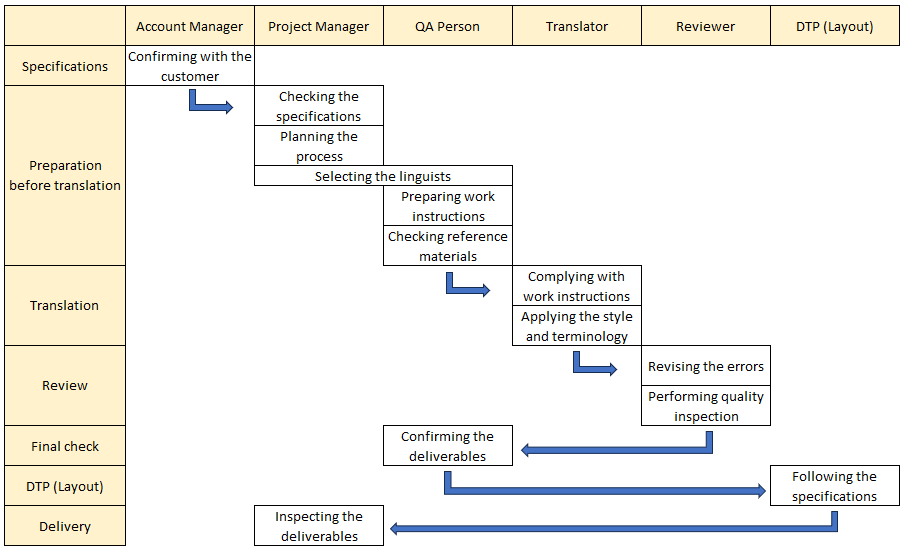Note: This blog post was originally written in Japanese for our Japanese website. We used our machine translation platform Translation Designer to translate it and post-edit the content in English. The original Japanese post can be found here.
The word "quality" is often used in everyday life. However, if you think about what it means, it's very subjective, often varying on the person using it. Especially in business, if there is a discrepancy in the perception of quality among the parties concerned, it may cause trouble.
This also applies to quality in translation. In this post, we would like to discuss what quality means in terms of translation services, and what it means to guarantee and manage that quality.

What is quality?
As mentioned above, the word "quality" is used in many different ways. For example, when you hear the phrase "high-quality computer," what kind of computer comes to mind?
The answer probably varies from person to person, such as a computer that can edit videos without stress, has battery that lasts a long time, has good graphics performance, or has a keyboard that is easy to type. It's because what people expect from a computer and how they use it vary. In other words, whether a product or service is of good quality depends on whether it satisfies the requirements and needs of the recipient of that product or service.

What is quality in translation services?
So, what does quality mean in translation services? Again, you'll probably get a variety of answers, such as having no mistranslations, conforming to the style guide, or having it easy to read. However, if this perception differs between the customer and the translation company, problems may arise with regard to the translation deliverables.
Therefore, it is essential to first clarify the customer's expectations and requests, that is, what kind of translation the customer needs. Based on this point, we can say that the definition of quality in translation services is:
| The degree to which the translation service (translation product) meets the specifications agreed upon in advance between the customer and the translation company. |
Since the word "specification" came up, let's also explain this word. In the JTF Translation Quality Evaluation Guidelines, specification is defined as:
| A summary of the requirements that a translation product should have based on the needs and objectives of the client and final reader. |
Examples of specifications include:
- Unit price
- Turnaround time
- Target language
- Target audience
- Whether you have reference materials
- Whether you need DTP (layout) work and its details
On a side note, we have discussed what kind of information is necessary when making a translation request in one of our posts — 5 Points to Clarify to Get a Desired Quote for Translation Services.
In other words, the quality of translation is the extent to which it satisfies the customer's requirements laid out by specifications agreed in advance.
Quality assurance in translation services
Now that we have defined quality, let's consider what it means to guarantee that quality. Quality assurance can be defined as:
| Systematic activities undertaken by the contractor to ensure and demonstrate that the customer's requirements, or specifications, agreed upon in advance are met. |
Since the definition on its own may be a bit abstract, let's explain it concretely. Translation projects involve multiple steps from quotation to delivery. In each process, different activities are carried out depending on the team or person in charge, with the aim of meeting specifications. Quality assurance is a system of these activities. The following is an example of a standard workflow for translation.

Quality management in translation services
The specific activities carried out to achieve quality assurance are quality management activities. As mentioned before, we perform the necessary activities to meet the customer's requirements agreed upon in advance in each process. For example:
Project manager
Before translation
- Checking the specifications and contacting the customer if there are any questions.
- Determining the optimal process according to the specifications.
- Selecting the most suitable translator and reviewer according to the field and use of translation.
Before delivery
- Inspecting whether deliverables comply with the specifications.
Quality assurance person
Before translation
- Checking the source files and reference materials and contacting the project manager or customer if there are any questions.
- Creating work instructions for translators and reviewers based on the specifications.
After translation review
- Confirming whether the reviewer's deliverables comply with the specifications.
Translator
- Complying with work instructions and providing error-free translations.
Reviewer
- Checking the translation for errors against the original language and document.
- Performing quality inspection.

Quality management is the individual specific activity that is performed to meet the specifications in each process, and quality assurance is the overall and systematic activity.
*Note: Quality assurance person refers to the person in charge of managing the content of the translation and not the entire translation workflow.
Summary
A correct understanding of terms related to quality, such as quality assurance and quality control management, is necessary in order to have a common understanding and to evaluate quality appropriately among related parties. Also, it is essential for providing translation services that meet customer requirements. We hope that this post will help you build a consensus on translation quality and help you understand quality assurance and quality management in translation services.
Kawamura's translation services
Kawamura International is ISO 17100 certified, which is an international standard for translation, and provides professional translation services based on the international standard.
We cover industries such as IT, software localization, medical devices, pharmaceuticals, tourism, manufacturing, finance, legal affairs, SAP-related documents, and all other general business documents. We assign the most suited translator according to your industry and area of expertise. Since our linguists are all experienced professional translators who have cleared our screening standards, you can rest assured in terms of quality.
Feel free to reach out to us if you are considering working with a translation company.
_CMYK_OL.png)

